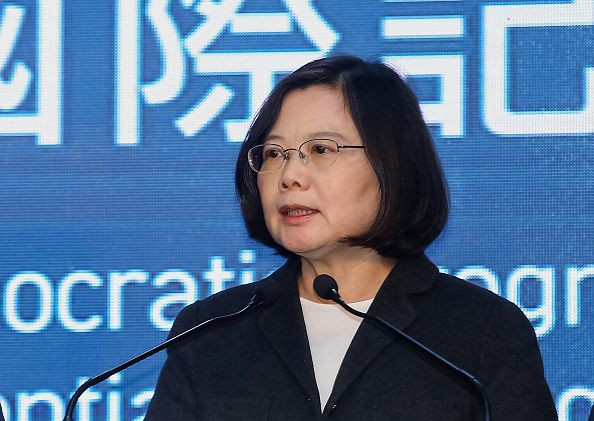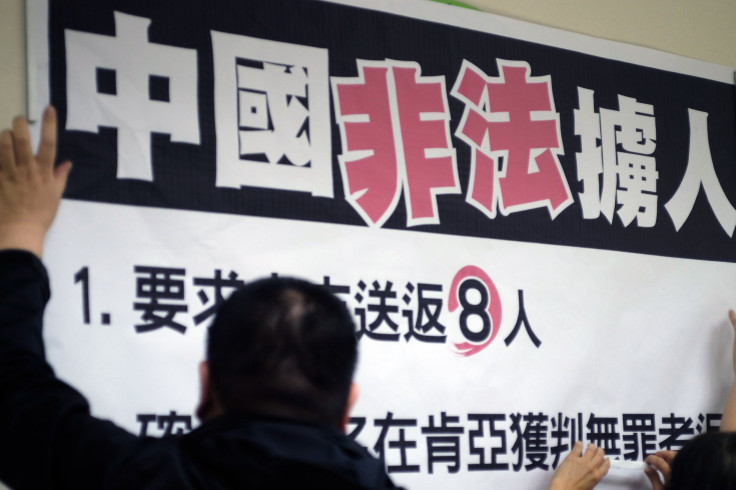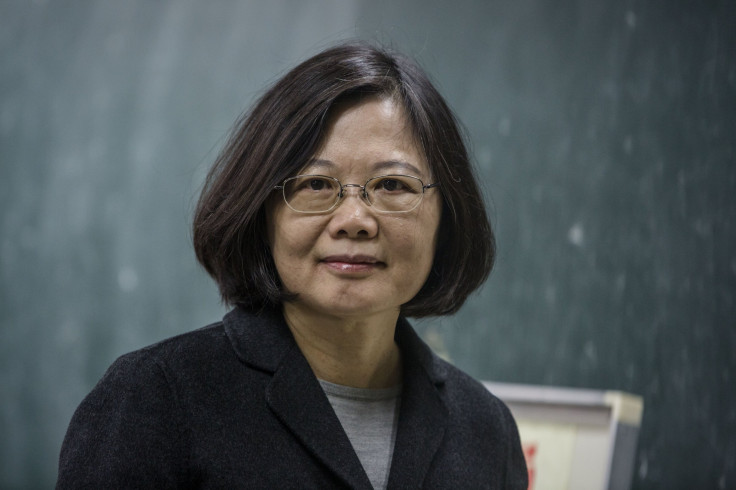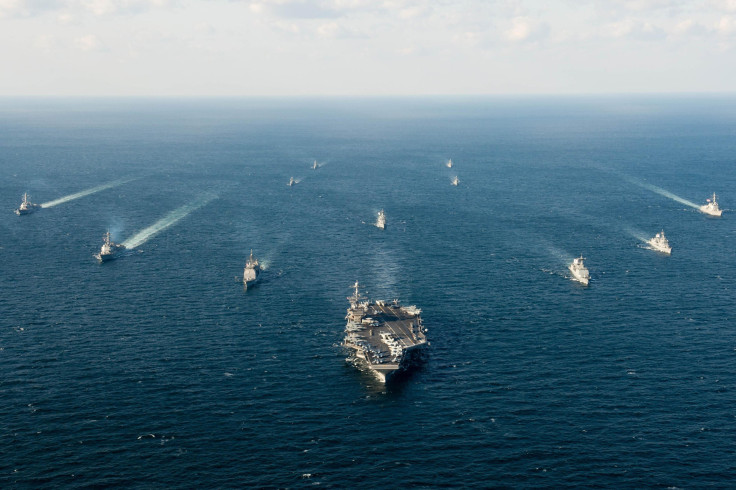Relations Between Mainland China And Taiwan On A Tightrope As New Taiwanese President Tsai Ing-wen Takes Office

SHANGHAI — Experts are predicting a bumpy start to Tsai Ing-wen’s presidency, as Taiwan’s new head of state — the first female leader of an ethnic Chinese territory — squares up with the mainland. Tsai, who won a landslide victory in January on a platform of boosting a Taiwanese identity separate from China, takes office Friday.
Tsai, 59, has said she will not seek to provoke Beijing, but China is deeply suspicious of her Democratic Progressive Party (DPP), which until the 1990s publicly called for formal independence from the mainland. Beijing has said it would use force in the event Taiwan formally declared itself an independent state.
Beijing has claimed the island, which lies off its southeastern coast, as part of its territory since 1949, when China’s Nationalist Party or Kuomintang (KMT) fled there after losing the Chinese Civil War to Mao Zedong’s Communist Party.
After her election victory, Tsai promised to “maintain the status quo for peace and stability across the Taiwan Strait” and “ensure that no provocation or accidents take place.” But the former legal scholar, a graduate of Cornell University and the London School of Economics, also pledged to “defend Taiwan’s sovereignty,” and called for respect for the island’s “national identity and international space.”
That’s not an idea that goes down well in Beijing, which insists that any country it has diplomatic relations with cannot maintain formal ties with Taiwan. Consequently, the island has only 21 diplomatic partners.

Since Tsai’s election, Beijing has established relations with one country, Gambia, which formerly had ties with Taiwan. It also intervened to have Taiwanese criminal suspects in Kenya repatriated to mainland China rather than to Taiwan itself, causing much anger in Taipei. And it has sent blunt signals it can block Taiwan’s participation in international bodies such as the World Health Assembly should it choose to do so.
In recent days, Beijing has staged war games, including a simulated coastal landing exercise, off its southeastern coast, opposite Taiwan. Chinese officials said these were routine operations, but few in Taiwan doubt their intent. And one Chinese newspaper, the Global Times, recently published a survey showing that 85 percent of readers wanted reunification by force, preferably within five years.
“China has signaled that it will play hardball over Taiwan’s international space, and we’ve already seen an end to the diplomatic truce. [Beijing] won’t give Tsai an easy time,” Jean-Pierre Cabestan, head of the department of government and international studies at Hong Kong Baptist University and former head of the French Research Center on Contemporary China in Taipei, told International Business Times.
Cabestan said it marked a stark contrast with the era of outgoing President Ma Ying-jeou, a KMT stalwart who confirmed his party’s rapprochement with China’s Communists by negotiating a series of trade agreements, opening direct air and sea links for the first time since 1949, and even holding historic talks with China’s President Xi Jinping in November, the first meeting between the heads of the two sides since the end of the civil war.

Beijing is likely to put pressure on Tsai to express support for the so-called 1992 consensus, which has formed the basis of China’s improved relations with the KMT in recent years, Cabestan indicated. The consensus refers to a meeting between representatives of the two sides, at which they effectively agreed that Taiwan was and would remain a part of China, even if each side had a different definition of which party or government was the rightful one. This tacit understanding was seen as a guarantee that the island would not declare formal independence.
For Tsai to officially endorse the consensus, as Beijing has demanded, is impossible, experts say, as it would go against her party’s 1999 resolution that Taiwan is a separate nation-state. But Tsai has made some compromises in recent months, acknowledging the 1992 talks took place, Cabestan said. And he suggested she would attempt to choose a form of words in her inauguration speech that would not upset Beijing.
“She has established some channels of communication with China,” the professor said. “Intermediaries have informed Beijing of the wording of her inauguration speech.”
And while Tsai served in government while the DPP last held the presidency, from 2000 to 2008, a time of frosty relations with China, observers note she did not push for independence during that period.

According to Cabestan, economic ties between the island and the mainland are now so close that frosty pragmatism is more likely than outright confrontation.
“The DPP now is very different from [the way it was] in 2000,” he said. “It’s much more aware of the constraints, including economic dependence on China. They have to maintain stable relations with China. And Tsai’s political appointments so far show that the economy is a priority,” he said.
With trade between the two sides currently worth an estimated $200 billion a year, and around a million Taiwanese people working on the mainland, even DPP officials in the island’s traditionally pro-independence south have personal links with the mainland, enabling Tsai to maintain party consensus about a pragmatic approach to China.
Nevertheless, the new administration is likely to seek to shift the island’s economic focus away from the mainland.
“Tsai will try her utmost to reduce economic dependency on China,” Cabestan indicated, with attempts to join the U.S.-backed Trans-Pacific Partnership trade group and plans to bring more investment into Taiwan’s high technology industry, some of which has shifted to China in recent years. Rising labor costs in China could also encourage the return of some industry to Taiwan, even as the government seeks to pass a free trade agreement with Japan. And Cabestan said Tsai may also try to redraft a controversial service trade agreement with China, which was drawn up in 2013 but never passed, after public protests against it.
According to a number of observers, Beijing’s response may be to downgrade regular meetings between the two sides from ministerial level to working-level discussions, as during the previous DPP administration. There have also been predictions China might ban mainland tour groups from visiting the island — some 4 million mainland visitors now visit Taiwan every year — to show its dissatisfaction.
But, as long as Tsai does not cross the red line of declaring formal independence, China is likely to keep this card in reserve, Cabestan said. Beijing is distracted by a host of other issues, such as tension with the U.S. in the South China Sea and with Japan in the East China Sea. With Beijing aware that an overtly harsh line on Taiwan is likely to alienate many on the island, the Chinese leadership is likely to be cautious: In the runup to the presidential election in January, many Taiwanese voters decided to back Tsai after a controversy over a mainland performance ban on a teenage Taiwanese pop singer who was photographed with a Taiwanese flag. Meanwhile, the Global Times, which published the poll showing public support for military action against Taiwan, was reportedly criticized by the central government.

One Chinese expert on Taiwan, Liu Guoshen, dean of the Taiwan Research Institute at Xiamen University, said at the time Tsai was elected, “If she acts in a pragmatic way and seeks more common ground with the mainland, cross-straits relations will be likely to proceed.”
Cabestan said Beijing was more likely to use an “incremental strategy” to “make Taiwan more dependent on China, more linked to China, both economically and culturally.”
At the same time, Cabestan said, China would seek to emphasize that choosing a KMT president in the island’s next election in 2020 would guarantee a more stable future:
“Their strategy is to make sure that Tsai won’t be re-elected in four years’ time. They want the KMT back in power. So they won’t give her any [diplomatic] gifts, they will keep pressure on — and they’ll stick by the KMT in the hope it will become credible again.”
It’s a strategy that may require a subtle approach by Beijing to succeed, with even KMT voters less than keen to reunify with a Communist China.
“They know they can’t threaten too much,” Cabestan said. “They want to win over and reach out to a lot of people in Taiwan society, such as the middle class. And for that they need to negotiate a fine line between criticizing Tsai and trying to weaken the DPP administration — and trying to win over more people to their side.”
Given the contradiction between likely moves by Tsai to reduce Taiwan’s dependence on China and Beijing’s desire to encourage precisely the opposite, most observers say some tensions are inevitable under the new administration.
But Wu Jieh-min of the Academia Sinica in Taipei told IBT recently that he was “positive that there will be no imminent crisis, for tourism, trade or investment between the two sides.”
According to Cabestan, relations across the Taiwan Strait will be “much more bumpy” under Tsai than under Ma, but not as rocky as in the years that preceded his leadership.
Nevertheless, 67 years after the end of their civil war, the two sides are once again likely to find their diplomatic skills tested in the coming years.
© Copyright IBTimes 2024. All rights reserved.






















